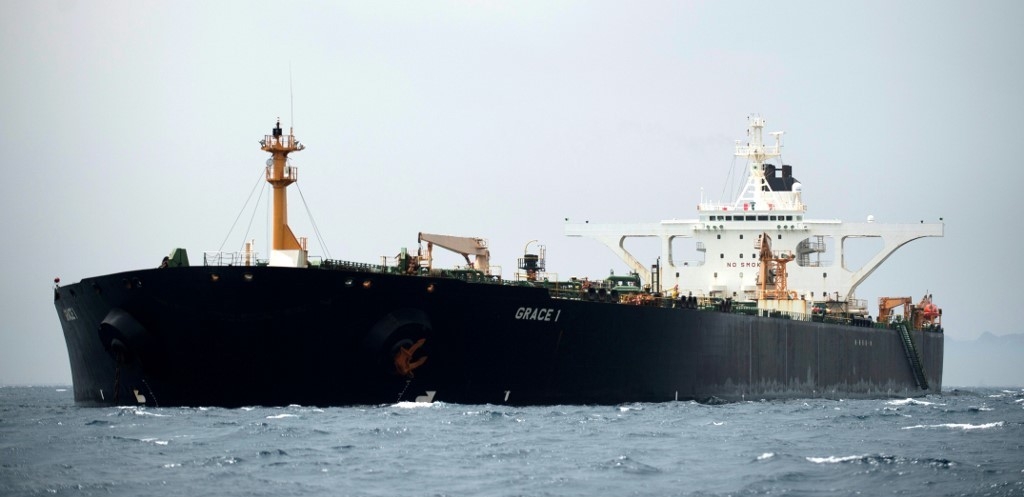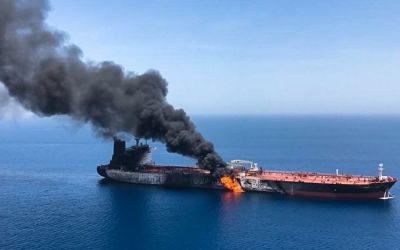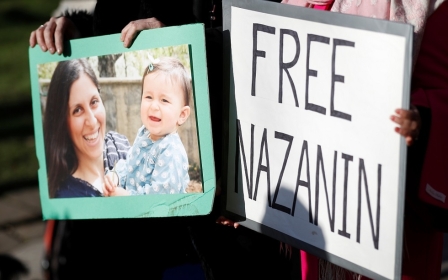US Justice Department issues warrant for Iran's Grace 1 after Gibraltar release order

The US Justice Department unveiled a warrant for the seizure of an Iranian supertanker captured by Gibraltar authorities last month on suspicion of shipping oil to Syria in breach of EU sanctions, AFP news agency reported.
The warrant was issued on Friday evening for supertanker Grace 1, one day after a Gibraltar judge allowed the release of the detained vessel, which was still in custody at the time of the warrant's issuance.
The warrant says the vessel, all the oil aboard and $995,000 are subject to forfeiture based on violations of the International Emergency Economic Powers Act (IEEPA), bank fraud, money laundering, and terrorism forfeiture statutes, AFP reported.
Earlier, Gibraltar Chief Minister Fabian Picardo decided to lift the detention order that had been imposed against the vessel after Iran guaranteed in writing that the ship would not discharge its oil in Syria.
Picardo said in a statement, “in light of the assurances we have received there are no longer any reasonable grounds for the continued legal detention of the Grace 1 in order to ensure compliance with the EU sanctions Regulation.”
New MEE newsletter: Jerusalem Dispatch
Sign up to get the latest insights and analysis on Israel-Palestine, alongside Turkey Unpacked and other MEE newsletters
Still, on Friday Iran’s foreign ministry denied any commitments were made in exchange for the tanker’s release, adding that the ship was never headed to Syria.
“Iran has made no commitment for the release of the Grace 1 tanker. Syria was not its destination and reiterated that it was nobody's business even if it was Syria," the foreign ministry spokesman was quoted as saying by Tasnim news agency.
Whether Gibraltar authorities still plan on releasing the vessel following the US's action was not immediately clear.
Hours before the US's warrant announcement, Reuters reported that the ship had "shifted position" but its anchor was still down off Gibraltar and it was unclear if it was ready to set sail soon.
Gibraltar authorities could not be reached for comment, the news agency said.
The United States on Thursday had made a last-minute legal bid to hold the tanker in detention, which delayed the court’s ruling and complicated the fate of the ship.
At the time, Gibraltar authorities said the US request, which was made independently, would be reviewed and a separate court case could take place. If the case went back to the Supreme Court before Grace 1 left Gibraltar’s waters, its detention could be extended.
Iran's Foreign Minister Javad Zarif accused the US of attempted piracy in trying to prevent the release of the tanker.
"The US attempted to abuse the legal system to steal our property on the high seas," Zarif tweeted. "This piracy attempt is indicative of Trump admin's contempt for the law."
Meanwhile, the Iranian ambassador in London said the US "faced a miserable defeat".
"All preparations are done for the tanker to sail into open waters, and the vessel will soon leave Gibraltar, " the ambassador, Hamid Baeidinejad, tweeted.
The detention of the Grace I brought tensions between the two countries to a boil.
Two weeks after the Iranian ship was detained, Iran impounded the UK-flagged Stena Impero in the Strait of Hormuz, accusing it of breaking "international maritime rules". Tehran has insisted that the Stena Impero's detention has nothing to do with the Iranian vessel.
A spokesman for the Stena Impero tanker, seized by Iran last month, said on Thursday that the situation remained the same with the ship and that the company awaited further developments from the UK and Iran.
Strained relations
UK-Iran relations are particularly strained at the moment, in part over the two tankers, but also over the faltering 2015 nuclear deal signed with other world powers, as well as Iran’s detention of British-Iranian nationals.
On Wednesday, the wife of renowned British-Iranian academic Kameel Ahmadi said that Ahmadi had been arrested in Tehran and taken to Evin prison on unknown charges.
He follows charity worker Nazanin Zaghari-Ratcliffe, who has been held by Iranian authorities since being arrested at Tehran airport in April 2016. She denies the charges of spying levelled at her.
More recently, an employee of the British Council, a cultural and educational organisation that operates overseas, was sentenced to 10 years imprisonment in May for “spying”. Aras Amiri was arrested in 2018 during a trip to visit relatives.
Meanwhile, the fate of tankers in the strategic Strait of Hormuz waterway off the coast of Iran continues to be a source of tension between Tehran, its Gulf neighbours and the West.
A series of attacks on tankers and oil structures in and around the strait – blamed on Iran by its opponents – has heightened both tensions and the oil price.
Britain is among some Western countries proposing a naval force be deployed on the route, through which a third of the world’s oil passes, in order to protect passing tankers.
Iran denies responsibility for the attacks and says it is responsible for maritime security in the region.
The sabotage attacks have come as Iran suffers under crippling sanctions imposed by US President Donald Trump after he pulled the United States from the 2015 nuclear deal designed to boost Iran’s economy in return for curbing its nuclear programme.
Middle East Eye delivers independent and unrivalled coverage and analysis of the Middle East, North Africa and beyond. To learn more about republishing this content and the associated fees, please fill out this form. More about MEE can be found here.






